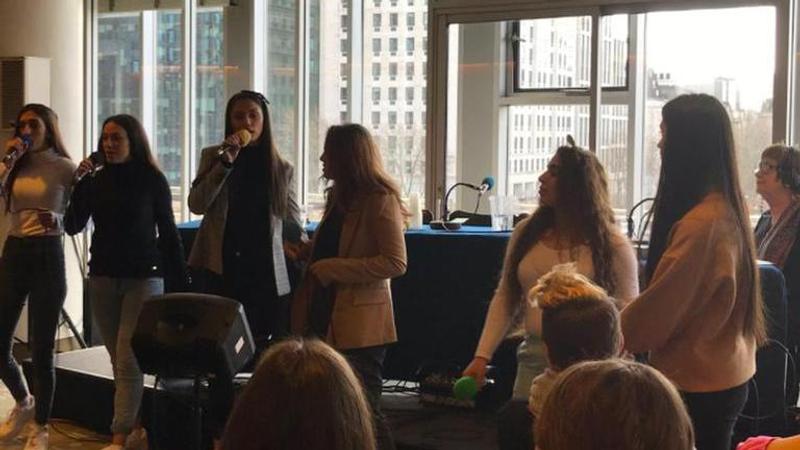Published 11:22 IST, June 22nd 2021
Serbian Roma girl band uses music to empower women
Among the most underprivileged ethnic communities in Serbia, and wider in Europe, the Roma largely live in segregated settlements on society's fringes, facing poverty, joblessness and prejudice.

Their songs are about "women chained" in abuse witnessed by generations, or teenage brides being forced into marriage by their fathers. But they tell women to seek love, fight back and stand up for their right to be equal with men. A female Roma band in Serbia has used music to preach women's empowerment within their community, challenging some deeply rooted traditions and centuries-old male domination.
Formed in 2014, "Pretty Loud" symbolically seeks to give a louder voice to Roma girls, encourage education and steer away from the widespread custom of early marriage. The band has gained popularity and international attention, performing last year at the Women of the Year Festival in London.
"We want to stop the early marriages, we want the girls themselves, and not their parents, to decide whether they want to marry or not," said Silvia Sinani, one of the band members.
"We want every woman to have the right to be heard, to have her dreams and to be able to fulfil them, to be equal," Sinani, 24, said that the idea for an all-female band was born at education and artistic workshops run for Roma, or Gypsies by the Grubb foundation — Gypsy Roma Urban Balkan Beats.
The girls initially danced in Grubb's boys' band and then decided they wanted one of their own, she said. "They (Grubb) named us 'Pretty Loud' because they knew that women in Roma tradition are not really loud," she said. A combination of rap and Roma traditional beat, the band's music is targeting primarily a younger generation of girls who are yet to make their life choices — the band itself includes 14-year-old twin sisters.
The songs tackle women's position and seek to boost their self-awareness. The quest is essential in the community where early marriages are widespread — a UNICEF study published last year showed that over one third of girls in Roma settlements in Serbia aged 15-19 are already married.
Of them, 16% were married before they were 15. Alarmed, Serbian authorities, too, have formed a state commission to try to reverse the trend. "I am an example of early marriage," said band member Zlata Ristic, now 27, who gave birth to a baby boy at the age of 16. "Nobody forced me into it but I have realized I should not have done it."
Now a single mother, Ristic said she wants other women in similar situations to know that their lives are not over once they have children, and that they can still pursue their dreams. "My biggest reward is when 14-year-old girls write to me and say they want to become one of us, that they now attend school thanks to us, that they have improved their grades," she said.
Among the most underprivileged ethnic communities in Serbia, and wider in Europe, the Roma largely live in segregated settlements on society's fringes, facing poverty, joblessness and prejudice. Activists have warned that the COVID-19 pandemic has further fueled social isolation of marginalized groups and increased their poverty.
Disruptions of regular schooling due to the virus lockdowns have made it even harder for Roma children to stay in the system. At the Grubb center in Belgrade's Zemun district, several children could be seen working with young instructors in an improvised classroom. The girls from 'Pretty Loud' teach at the music and dance workshops run by Grubb, which established in Serbia in 2006.
Diana Ferhatovic, 18, first came to the center four years ago, initially seeking help with school lessons before joining the music program and finding her way into "Pretty Loud." The performance in London last March — just as the COVID-19 pandemic was starting — was unforgettable, she said. "I had a kind of positive jitters, we all did at first, the whole group," Ferhatovic said. "Then we blew them off their feet"
Updated 11:22 IST, June 22nd 2021




